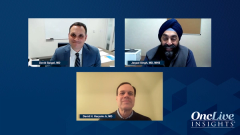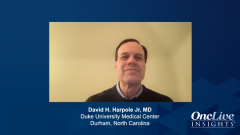
Neoadjuvant Therapy and Other Emerging Therapies in Early Stage NSCLC
Experts discuss the role of neoadjuvant therapy and other emerging therapies in the treatment of early-stage NSCLC.
Episodes in this series

Transcript:
David H. Harpole Jr, MD: We’re eagerly awaiting the published and presented results of AEGEAN. There’s a press release that says AEGEAN—up-front chemotherapy plus durvalumab with consolidated durvalumab after, randomized to placebo—met the primary end point of at least 20% pathCR [pathologic complete response]. I don’t have any more information. But that’s a different regimen because it was immunotherapy up front but immunotherapy after as well. We hope we’ll be hearing about that.
David Spiegel, MD: Our friends in the breast cancer world have been dealing with this issue with triple-negative breast cancer. Historically they give preoperative aggressive chemotherapy up front, take them to surgery, and then flip it. Let’s say they give a platinum-taxane up front, go to surgery, and [the patient] still has significant cancer…. They’ll give adjuvant capecitabine, for example. I find myself doing more neoadjuvant therapy, but I’m not sure if I should give more. Three cycles is probably enough, but when you have somebody who still has cancer at the time of surgery, you feel like maybe you needed that fourth cycle. It’s silly to think that, but I do.
The other thing is that this woman’s case is tough because she had more cancer than we thought. We worked her up. Our pulmonologists are so good. We do extensive mediastinal evaluation, and she didn’t have any mediastinal disease preoperatively. Then we treat her. We take her to surgery, and they aborted surgery because she had extensive mediastinal disease. This raises some questions, so [afterward,] I gave her chemotherapy, radiotherapy, and I/O [immuno-oncology]. She got the kitchen sink but a different chemotherapy regimen, obviously. I don’t know if that’s the right thing to do.
That’s a great case, David. It’s obviously a real-world case, but those are the tough questions that we discuss at our tumor board. No matter where you practice, it’s ideal to have friends you can lean on—colleagues like pathologists, pulmonologists, radiation, surgical oncology, and even other medical oncology colleagues. I always learn something when I’m at a conference. You might think you know it all, but you don’t. You’ll always learn something from another set of eyes looking at something. Even the radiologist going through it at the conference teaches you something that you didn’t see on your own.
Transcript edited for clarity.





































